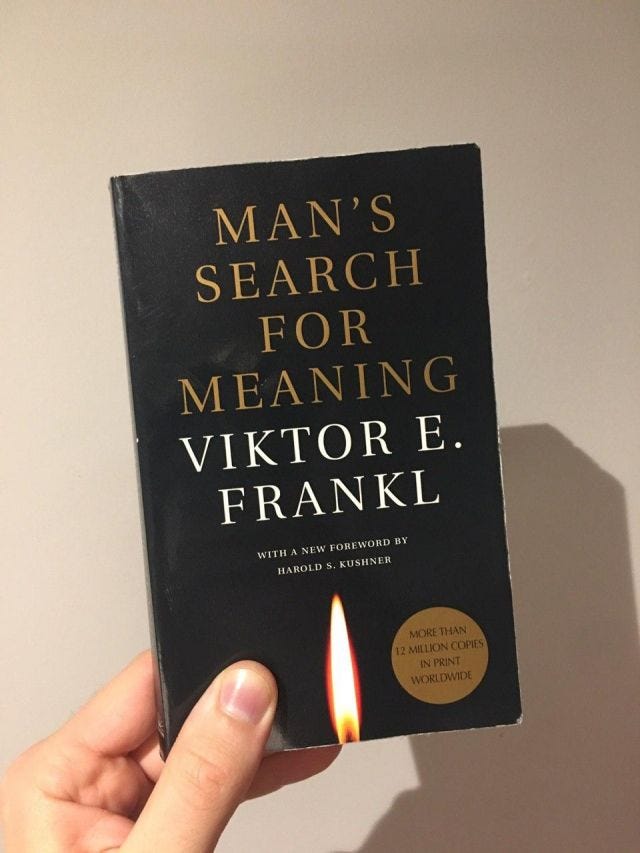Do the Opposite - Meaning, Paradoxical Intention, Touching Mars
Hello friends,
Welcome to the newest issue of the Do the Opposite newsletter, sent every Monday! If you like it, please forward this email to your friends or share this link with them: tinyletter.com/dotheopposite
prodigy
If you want to share any resources, articles, books or anything else with the community, please reply to this email with your recommendations!
_________
Man's Search For Meaning

This week I've finished a book "Man's Search for Meaning" by Viktor E. Frankl. I've been planning to read this book for many years, and I was wrong to put off reading it. It is extremely powerful in giving perspective on the world today, and on life in general.
Viktor was a psychiatrist and a Holocaust survivor. He has created Logotherapy - a school of psychotherapy that solves psychological and existential issues of patients through helping them find meaning. Frankl was fond of Nietzsche's quote: "He who has a why to live for can bear almost any how."
The first part of the book is about Frankl's time spent in the concentration camps of the Nazi Germany. It's absolutely chilling to read, and leaves reader in awe of the pure power of character needed to survive that kind of experiences and to find meaning afterwards - and to help millions of others to do the same.
If you haven't read this book, I strongly urge you to do it.
The second part of the book talks about the concept of logotherapy and gives the reader ideas on how to apply them in their own life.
I really liked a practical tip on reversing negative behaviours that tend to reinforce themselves through a vicious circle, such as phobias, OCD behaviour and more. It's called "paradoxical intention".
Let's say you are suffering from insomnia. You lay down at night, and "try to sleep". You fail, and the more you try, the less successful you are in this. Applying paradoxical intention to this would be to do the opposite (😉): to lay down and try not to sleep. Such intention breaks the vicious circle of control and tension, and it becomes harder to fight sleep.
Second example: you suffer from a bad habit of biting your nails when you are nervous. Applying paradoxical intention in this case: you would bite your nail on purpose, being very thorough and articulate in your movements. It will, of course, become funny to you. Through that you are breaking the bad habit - in your mind, you disassociate it from stress, and make it powerless.
Think about it some more and see if you might be able to use paradoxical intention in your life!
Another idea I've gathered from Frankl is that happiness, love, success and many of the good things in life can't be 'made to happen' and only appear as side-effects of us living and doing our work. He says that the more you aim at success, the less you will find it and the harder it will be to get. Success can only ensue from the work you are doing, and you would be better off forgetting all about it, focusing on the things you want to accomplish instead. The surrender of control is a beautiful idea.
Think about it: the more you are looking to find that right person for you, obsessing over it, the more agitated and desperate you appear to others. Same goes for finding a job - go to the interviews with an attitude that you don't even need that job, and talk instead of the possibilities and ideas you can bring to it, rather than trying to justify why they would want to hire you.
As they say, stop trying to catch a butterfly, and it will land on your shoulder.
"The Windup Girl" - thoughts

This book is beautiful, Paolo is a true master of world creation. The Bangkok of the future (I've calculated maybe 200-300 years in the future), after demise of the technological civilization as we know it. The failing crops, engineered viruses destroying plants and people, genetically engineered fruit, animals and even humans. Complete ecological disaster is the state of the whole world.
Telling this story, the author jumps from one to another of about 5 characters. Each of them belongs to a different "world", has a unique perspective on the situation, their own motive for behaving the way they do. As a reader you feel like you are given a 360 degree rotating camera view of the events as they are happening - as we jump from character to character. Their paths intersect, and we never know for sure what will happen when they do.
I highly recommend this book if you are interested in sci-fi.
Surprise announcement coming up
It's not going to be anything huge (yet) but I will announce something new about Do the Opposite in the next week's newsletter. :) This is my public commitment to work on that so it's ready by next Monday.
Articles:
1) "Ideas are just a multiplier of execution" by Derek Sivers
The logic here is that no idea, no matter how great it is in its potential, is worth something until it's implemented. Thus, if the idea is worth 1 million, but has zero execution, it's of no consequence - it doesn't bring anything new into the world. However, if you take an idea worth $1000 dollars and multiply by the effort of 100 - you already have created a value of $100,000.
So if you have an idea, take action to make it a reality. Who knows, maybe as you keep working on one average idea, you will receive (note the word receive here) more adjoining ideas that all lay in close proximity to the subject of your work, and one of them might be the one that will change everything. You might decide to pivot towards that idea or merge it with your existing idea. That's how Twitter was created, by the way. Initially it was supposed to be a service of short messages for a taxi service coordination, but then they pivoted into a short-message service for the general public.
2) "Plants talk to each other using an internet of fungus" by Nic Fleming of BBC
This is absolutely fascinating! Apparently, the plants can communicate, share chemicals and more through the connection made possible by the mycelial network of fungi. A plant connected to another in such a way can, for example, warn another of a danger, if it's being attacked by insects or pathogenic fungus. Full-grown trees can supply young trees with the chemicals they might be lacking. It's estimated that 90% of plants are connected that way. See more on this below in the videos, in the TED talk by Paul Stamets on mushrooms and their surprising qualities that can help humans in various ways.
Tweet that made me think:

Videos:
1) "Is It Okay to Touch Mars?"
In this video, Michael from Vsauce paints us a picture of the challenges which humanity will encounter when it (very soon - by year 2030) starts colonizing Mars. We get to see what the Mars flag will probably look like, based on the Mars-related projects on Earth which have been using the flag for quite some time. We learn how many of the atoms comprising our body are from outer space, not Earth itself - as Earth is constantly bombarded by meteorites, these atoms become a part of the Earth through scattering by weather patterns, through assimilation by plants, and such. There is a lot more interesting facts about Mars in thVideos:e video. If you like Astronomy and are fascinated by space and the potential of humanity becoming multi-planetary - give this video a watch!
2) "The Zipf Mystery"
Another video by Michael (I binge watched a bunch this week :). Here he is exploring a mystery of the word frequency distribution in texts. Turns out, if we arrange words by frequency in any text, the second most used word will appear in the text almost exactly two times fewer than the most used. The third will appear one third as often, the fourth - 1/4 as often, etc. This pattern keeps going on so consistently, that the frequency of the word appearing can be calculated by 1 divided by rank of the word. (see the illustration below for reference) What's fascinating is that this is true of any language invented by us, humans. More than that, this is just one of the natural manifestations of the Pareto's Principle, also known as 80/20 Principle: "Roughly 80% of all the effects come from 20% of the causes". For example, 20% of salespeople generate 80% of company's revenue. Watch for more fascinating and yet inexplicable facts.
We will definitely cover the wide implications of the Pareto's Principle in another issue of this newsletter ;)

3) "6 Ways Mushrooms Can Save the World" by Paul Stamets
Mushrooms are way more interesting and complex than we are accustomed to believe. This video is related to the article above (on the internet of plants via mycelial fungus network). Paul talks of various uses we can have for mushrooms: cleaning polluted soil, making insecticides, treating smallpox and more.
Fun fact: If you watch the latest Star Trek: Discovery (I am personally a huge Star Trek fan :), the concept of a mycelial network from the show is built on the discoveries and ideas of Stamets - and as a tribute to him, Chief Engineer's name in the show if Paul Stamets.
Ethos:

Quote:
"Never make fun of someone if they mispronounce a word. It means they learned it by reading." - Anonymous
_________

TELEGRAM CHANNEL: Do the Opposite has a public Telegram channel. The content there is a little different than in the newsletter: faster to consume, a bit more random - basically anything weird or interesting that catches my eye - articles, tweets, videos, images, etc. Hope to see you there as well! :) Here it is: t.me/dotheopposite
If you find this newsletter helpful, please consider forwarding this email to to your friends! Or just give them this link: tinyletter.com/dotheopposite
Keep doing the opposite,
Alexander Kallaway
Website: dotheoppo.site
Twitter: twitter.com/ka11away

